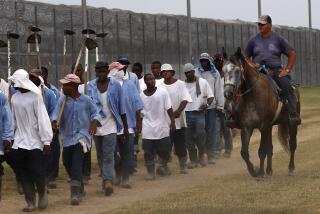INS Vows to Pursue Punishment of Lawyer
- Share via
Immigration officials said Thursday they are seeking to prevent an El Centro attorney from practicing before the Immigration and Naturalization Service as punishment for her role in a hunger strike at a holding camp for aliens.
INS Western Regional Commissioner Harold Ezell has accused Graciela Zavala of helping to “orchestrate” a hunger strike that began Monday at the INS detention facility in El Centro. Ezell said in a written statement that Zavala incited the aliens at the camp and “contributed to the disruption within the facility itself.”
Earlier this week, Zavala heatedly denied the charges and called the allegations by Ezell and INS District Director James B. Turnage Jr. “clear-cut lies.” Zavala, an attorney with the Imperial Valley Immigration Project, was unavailable for comment Thursday.
Turnage said that Ezell has officially notified Zavala of his intention to have her suspended from practicing immigration law. Ezell has also asked the California Bar Assn. to look into Zavala’s “unprofessional conduct.”
Attorneys like Zavala frequently represent aliens before INS appeal and review boards, and administrative law judges. While the INS can prevent Zavala from practicing in those forums, the agency cannot prevent her from practicing law in a courtroom.
Most of the hunger strikers are from Central America. According to Zavala, they are protesting overcrowding, poor sanitation and violations of their legal rights. On Monday, Zavala, who represents some of the strikers, said that 300 aliens were taking part in the strike.
The camp holds about 500 illegal aliens, all of them men. They are awaiting deportation hearings on whether they can stay in the United States. A majority of them are from Central America and they are seeking political asylum.
INS officials later put the total of strikers at 175, and on Thursday said that only 12 aliens were participating in the strike. The remaining strikers are taking liquids only, and officials said they were prepared to force feed the protesters if necessary.
Ezell said in a telephone interview that early Thursday detention officers and Border Patrol agents in riot gear moved the protesters from a recreation yard where they had been camped out into an “isolation dormitory.” He said they were taken one by one in plastic handcuffs into the dormitory to be examined by a doctor.
Ezell said the strikers did not resist the move, and there was no violence. He said at least 30 of them left the strike afterward.
But Shari Cruhlac, a law clerk and supporter of the strikers, said that she spoke in person and by telephone with at least 10 witnesses inside the detention facility who claimed the officers “brutally” moved the strikers and “beat many people severely, striking them with a club, pulled their hair and dragged them by the feet into the barracks.”
Ezell called the charges “Lies. Absolute lies.”
Ezell and Turnage said Zavala incited a riot at the camp by using a bullhorn to encourage the strikers to commit violence. However, both officials said the situation never became violent or got out of hand. According to Ezell, Zavala encouraged the strikers to burn a mattress to emphasize their demands.
A handful of strike supporters, including Zavala, demonstrated in front of the camp on Wednesday for three hours. El Centro police reported no incidents and a spokesman said that police saw no evidence that Zavala or other protesters were inciting a riot.
On Thursday, Turnage used a press conference to repeat earlier charges that Zavala organized the strike to air her group’s disapproval of U.S. policy in Central America. But when pressed repeatedly to substantiate the allegation, Turnage failed to provide proof.
Turnage also mentioned that Zavala was seen in the company of a group that is involved in the sanctuary movement. But he denied that INS officials are taking action against Zavala because of her possible involvement with the movement. People involved in the movement use churches to provide sanctuary for Central American refugees who are in this country illegally and in danger of deportation by the INS.
Joe Flanders, an INS spokesman in Los Angeles, said that Zavala has 30 days to respond to a letter from Ezell informing her that Ezell has recommended that she be disbarred or suspended from practicing before the INS. According to Flanders, Zavala has the option of asking for a hearing before Ezell to appeal the charges against her. Ezell’s recommendation will be forwarded to the U.S. Immigration Board of Appeals in Washington, D.C.
The board will then act on Ezell’s recommendation and make a decision as to whether Zavala should be suspended, disbarred or the board can decide that no action should taken against her. U.S. Atty. Gen. Edwin Meese will make the final decision as to what action, if any, should be taken against Zavala, said Flanders.
Meanwhile, in Los Angeles federal court, attorneys for the various immigrants’ rights groups filed a petition accusing the INS of cutting off contact between the lawyers and the Salvadorans involved in the hunger strike.
Attorneys for the Central American Refuge Center, National Center for Immigrants’ Rights, Legal Aid Foundation of Los Angeles, National Lawyers Guild and American Civil Liberties Union all joined in asking for a temporary restraining order against the INS to stop its agents from denying the lawyers access to their Salvadoran clients who are seeking political asylum.
More to Read
Sign up for Essential California
The most important California stories and recommendations in your inbox every morning.
You may occasionally receive promotional content from the Los Angeles Times.










